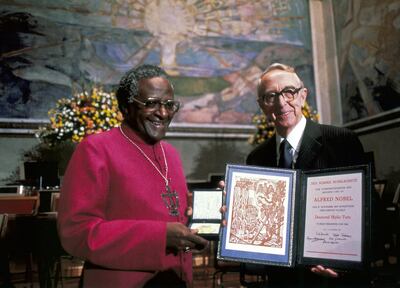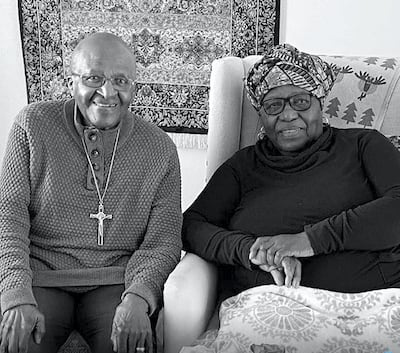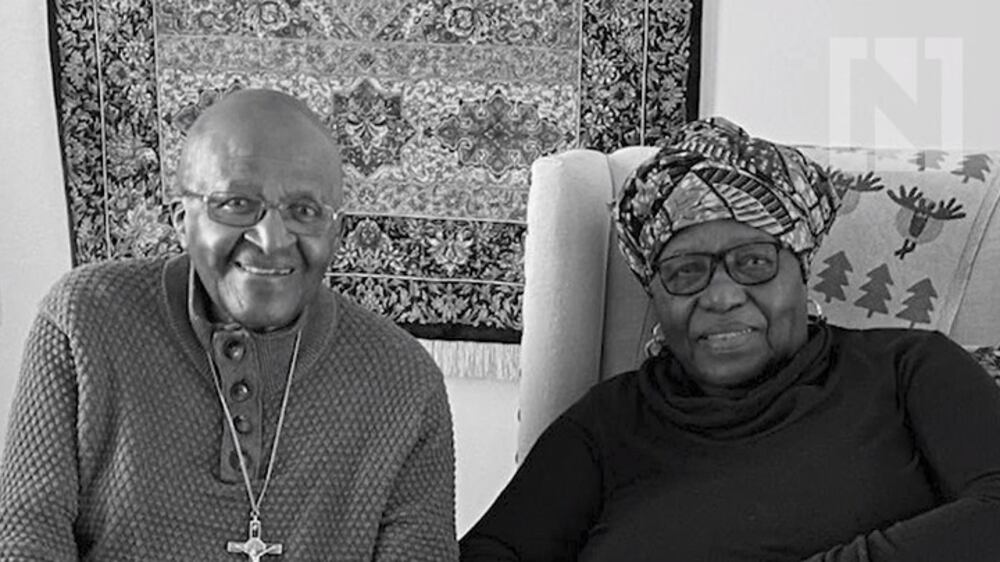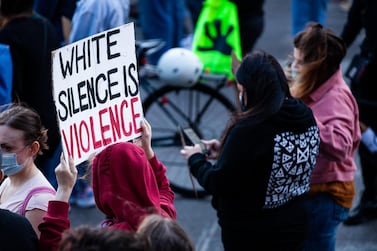It is the phrase that has come to symbolise the feelings of many around the world about the Black Lives Matter movement since George Floyd died while being restrained by a police officer in Minneapolis last month.
The same 16 words have been shared countless times on and off social media, echoed by those from all walks of life as the anti-racism protests sparked by Floyd’s death spilt over from Minnesota to around the globe.
Headmasters have sent them out as a source of inspiration and guidance in messages to pupils watching the unprecedented events unfold from their homes during lockdown.
What has become known as “the oppressor” quote is often not only heard but also seen at the demonstrations, emblazoned on face masks and T-shirts worn by supporters of the international human rights campaign.
Now, it has been recited like a mantra by a dozen people who are somewhat closer to the man who spoke it first. The 12 grandchildren of the retired cleric and anti-apartheid activist, Archbishop Emeritus Desmond Tutu, have come together in a video released on Tuesday, to say: “If you are neutral in situations of injustice, you have chosen the side of the oppressor.”

Their grandfather, one of the most loved and respected proponents for peace and reconciliation in modern times, uttered the words in 1984 in the book Unexpected News: Reading the Bible with Third World Eyes, by Robert McAfee Brown.
It was the year that the South African theologian, who became known internationally for his commitment to non-violence and support for economic sanctions in the struggle against apartheid, won the Nobel Peace Prize.
The progeny of the man affectionately referred to as “The Arch” released the video message in support of #BlackLivesMatter in honour of Youth Day in South Africa, and before what is known as “Juneteenth” in the United States.
Youth Day commemorates the Soweto Uprisings that began on June 16, 1976. Schoolchildren led a series of protests against being taught in Afrikaans, which Archbishop Tutu’s grandchildren described in a statement as “the language of the oppressor”.
Juneteenth, also known as Freedom Day, is celebrated on June 19 to mark the date in 1865 when orders were publicly read that all previously enslaved people in Texas were made free.
Lungi Morrison, one of the granddaughters of Archbishop Tutu and his wife, Leah, said from her home in Accra, Ghana: “This moment in our history is about truly showing up, mindful of the ideals so many generations like our parents and grandparents paid forward for us.
“It is a moment to actually embody and reclaim justice, not as something that ought to be handed to us [but] rather, justice is a human right – as a black woman, mother, daughter, sister and human in the world.”
In 1986, Mr Tutu became the first black person to be appointed to the highest position in the Anglican Church in South Africa, the Archbishop of Cape Town. He continued to speak out against the apartheid regime, organising peaceful demonstrations in which thousands marched beside him.
When apartheid ended and Nelson Mandela became the South African president, the archbishop was appointed as head of the country’s Truth and Reconciliation Commission to investigate human rights abuses.
He served for many years as president of The Elders, the international non-governmental organisation of public figures noted as statesmen, peace advocates and human rights activists, that was set up by Mandela in 2007. He is still an honorary Elder today.
Mandela, who died in 2013, once said that his great friend was “sometimes strident, never afraid and seldom without humour”.
While Mr Tutu retired from the commission in 1998 and from public life in 2010, he has continued to advance the cause of multiracial democracy around the world, predominantly through the Desmond and Leah Tutu Foundation.

His phrase, which has captured the hearts and minds of so many during these times of strife and features in the video message shared by his grandchildren, is not, in fact, the entire quote. The archbishop went on to say: “If an elephant has its foot on the tail of a mouse and you say that you are neutral, the mouse will not appreciate your neutrality.”
The veteran anti-racism and peace campaigner, now 88, may not have spoken out publicly about the scenes since the death of Floyd on May 25 but his words of wisdom from the past have reverberated powerfully down through the decades.







